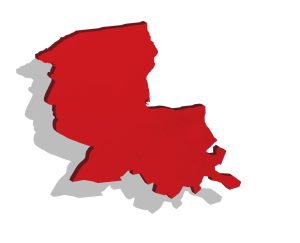Now Would be a Great Time to Major in Public Health
Many of our Public Health classes are taught on our downtown campus, seen here. It’s smack in the middle of downtown NOLA’s medical district.
May 21, 2020
The following is a recent blog post by Jeff Schiffman, republished with permission. It was first published on the “Tulane University Admission Blog.”
If one of your reactions to the global pandemic has been, what can I do to help? then the title of this blog says it all. Now is a really good time for you to consider a career in public health. It just so happens that Tulane has one of just a dozen undergraduate programs in Public Health in the USA, plus an incredible graduate School of Public Health and Tropical Medicine as well. In fact, back when we were founded in 1834, we were founded as a response to the major public health issue at the time: Yellow Fever. Almost 200 years later, Tulane continues to be a global leader in public health. Even before COVID-19, public health was one of the fastest-growing undergraduate majors in the world.
For today’s blog, I am going straight to the source and featuring two amazing guest bloggers: Sierra Cason and Didi Ikeji. Sierra is one of our admission officers and just wrapped up her Master’s in Public Health at Tulane. Didi is a rising senior and enrolled in our undergraduate program for Public Health and was just admitted into our accelerated 4+1 degree program. I posed a bunch of questions to them both. Take it away, ladies!

In the basic sense, what is public health? Sierra Cason: Public health is working to keep people and communities from becoming ill in the first place. Many people ask me if public health means you’re a doctor, and I always tell them that doctors treat individual people who are already sick, while public health officials are executing plans that make the environment healthier, not just a person; they create services for communities and not just individuals because when we approach health from a population lens, we eliminate health disparities and inequities that are impacting a larger number of people.
So… why public health now? SC: I think it’s obvious why public health matters right now! Our world has changed in a matter of months. We are spending every minute on vaccination testing, battling with the controversy around public health decision-making, implementing social distancing guidelines, struggling with shortages of critical supplies, and seeing how social determinants of health (race, socioeconomic status, environment, etc.) can lead to high mortality rates, and impact incidence and prevalence rates. We need more students over the next decade to pursue public health, so that we have more professionals to guide us during life post-COVID-19, better prepare us for future disease outbreaks, and continue to address the health inequities we see around the world. Because of the COVID-19 pandemic, public health has received greater recognition and new appreciation.
Didi Ikeji: Public health has always been an important topic but is rarely given enough funding or attention. Often times, the areas of health that you hear about are doctor-patient specific and focus on individuals and their health. However, the most important, first step, most cost-effective bang-for-your-buck way to improve health is through education. Public health individuals at all levels are primarily educators. The goal is always to educate the population before the unwanted health outcome occurs. With the current COVID-19 pandemic, many areas of public health are now getting increased attention, which is great but has unfortunately come at the cost of many lives. This shows how important it is to train the next generation of public health students who can prevent a crisis like this from happening again. It should not take a crisis for things like mass sanitation, health disparities, and insurance to finally be given attention. My hope is that the next class of Tulane public health graduates will learn from the things happening right now to become the next pioneers in national and global health.
What’s so special about Tulane’s undergraduate Public Health program? DI: My favorite aspect about the public health program is all students have to do are take two core classes and then they are able to take almost any other public health course offered. There are seven more core classes after the first two, but students can fit those in at any time throughout their four years. There are also six elective class requirements, but students can select any courses they find interesting. The courses range from nutrition to global maternity and child health, to research methods. Every semester there’s also special topics courses that are offered that semester only. Another amazing aspect of the program is the option to do a combined degree and graduate in five years with both a BSPH and a master’s degree. Tulane offers six different public health masters programs so students can find any program within their interests.
What’s been your favorite class? SC: In the Master of Public Health program, my favorite class was “Violence as a Public Health Problem.” This class provided a broad view of various types of violence from a public health lens. I studied the epidemiology of violence first, followed by public health solutions to these issues. What kept it interesting was each class covered a different type of violence (child abuse, gun violence, domestic violence, etc.), so each class was taught by a different local academic or expert in the field. We also discussed related fields such as social work, psychology, law, and politics. This class was not for the faint-hearted.
Any favorite professors in Public Health? DI: Some of my favorite professors by far have been Lina Moses and Elisabeth Gleckler. On top of being a faculty member, Professor Moses is also working for the World Health Organization coordinating outbreak relief. This means when there are major outbreaks, she is one of the individuals on the forefront. She told amazing stories of organizing teams to help with Ebola and Lassa fever outbreaks in Nigeria and Sierra Leone. During this COVID-19 pandemic, she flew directly to their headquarters in Switzerland to serve on a strategic planning team. Professor Gleckler is another one of my favorite professors because of the vast number of things I have learned in her courses. They were instrumental in developing my writing abilities. She has also done amazing work through the Louisiana Office of Public Health and began her career working with individuals with end-stage HIV/AIDS. These are just two out of the dozens of faculty members at Tulane doing cool work! One time my friends texted me because their professor was on CNN! And every month there’s a faculty member getting large grants or featured in the news because of their work. Professors like these are amazing because students can learn not only about the specific course they’re teaching but also through their lives and work.
Can you give me some examples of research, internships or study abroad at Tulane for public health majors? DI: There is such an expansive offering of research, internships, and public health study abroad programs at Tulane. Every Monday, public health students are sent an email with information regarding guest lecturers, exhibits, and public health events happening at Tulane and in New Orleans. These events are very informative and a great way to make connections that can lead to future positions. Students can do technical lab research, sociological population-based research, design their own research, and complete an honors thesis. Most labs at Tulane allow anyone to work in them regardless of major. Additionally, public health students have access to the downtown campus, which has large portions dedicated directly to research. The Louisiana Cancer Research Center, Ochsner, and other nearby hospital systems are easy ways to get connected to shadowing, research, and internships. Most professors begin the semester by explaining their research interests and let students know if they are looking for any undergrad workers. Clubs and organizations are a great way to connect with fellow students, as well as gain research and internship positions. Tulane offers a public health-specific study abroad program on every continent except Antarctica. Students also have the option of selecting a program of their choosing, regardless of it is specifically labeled a public health program. With summer, semester, and yearlong options, it is easy to fit into your schedule. Personally, while at Tulane I joined a club through Newcomb Institute called Women in Science. Every year the club hosts a panel where female doctors in the community are invited to come speak to club members and answer questions. After the meeting, I became really interested in the work one of the doctors was doing; a senior club member was working with the doctor at the time and gave me her contact information and invited me to come see her work firsthand at Ochsner. Starting that semester, I began shadowing the doctor and have worked summer internships through Ochsner two years in a row. I am now writing my thesis based off the clinic I work in, and it all began from a club I joined freshman year!
What’s the MPH program like? SC: Tulane prepares students for careers in public health domestically and internationally with study in all five areas of public health, plus tropical medicine. You gain classroom knowledge from faculty who are diverse, committed public health professionals, who are regularly recognized among their peers with awards, prestigious memberships, and important roles and responsibilities on task forces, boards and within associations. You gain real world experience through the 300 hour practicum, an opportunity to apply your classroom experience in a variety of settings outside of the university. There are endless opportunities to participate in research, academic institutions, student clubs and organizations and be active in the New Orleans community.
Any final advice for anyone considering this career? SC: Public health is a diverse field, it has so many different avenues, and is related to so many other fields. A few tips:
- Learn a bit about each area of public health offered at Tulane, before making an assumption about what it is. We cover the following areas of public health: • Biostatistics • Epidemiology • Environmental Health • Global Community Health and Behavior • Health Policy and Management • Tropical Medicine (Some of these areas have sub-areas like, maternal and child health, nutrition, health education, etc.)
- Study public health as a major or a minor, and pair it up with another area of study. From what we can see during this pandemic, public health impacts all areas of life, so having public health knowledge and skills, might now be critical regardless what field you enter.
- Gain field experience while you are studying, many jobs seek that you have some practical experience in the field. So make sure you do internships, research or volunteer work to gain real world experience.
Thank you, Didi and Sierra! And to our readers, we hope your interest in Public Health has been substantially piqued. The world needs you right now!
Read the original blog post on Tulane University Admission Blog.











Leave a Comment